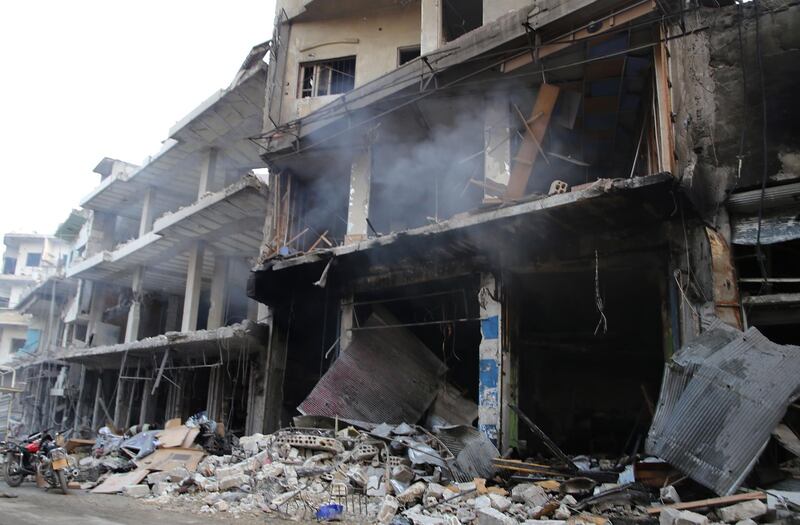Rebels in northern Syria that have received American money and weapons for years via a CIA-run programme say they will continue to fight even though the aid has ended, while admitting they do not know how they will support their efforts.
Some of the groups, whose fighters number in the thousands, have received US assistance since 2013. They fight mainly in the provinces of Aleppo, Idlib and Hama. Idlib is the last Syrian province where rebels fighting the government of Bashar Al Assad hold significant territory.
After reclaiming large parts of eastern Syria from ISIL in recent months, Mr Al Assad’s forces — backed by Russia, Iran and an array of militia groups — are moving on Idlib. A likely first objective is the recapture of Abu Duhour, a military airport in eastern Idlib that has been under rebel control for more than two years.
The decision to cut aid was announced earlier this year by US president Donald Trump. Shipments of weapons to the groups, who were supposed to act as a “moderate” counterweight to religious extremists who have gained prominence in the rebellion against Mr Al Assad, ended in June.
Officers and fighters from the US-supported groups said that monthly military salaries ranged between $100 and $150 (Dh367-Dh551), and that the last of those were paid out this month.
Idlib is mostly run by a patchwork of rebel groups that sometimes fight among each other while at the same time fighting alongside one another against the Syrian government.
The end of aid could swell the ranks of Hayat Tahrir Al Sham, an umbrella organisation that includes groups with ties to Al Qaeda.
“There is a possibility that Hayat Tahrir Al Sham will swallow groups that have stopped receiving support,” said Hasan Haj Ali, an officer in the Free Idlib Army. “And there is a possibility that fighters will go by themselves and join Hayat Tahrir Al Sham, [which] has its own sources of support.
"The fighters … they want to fight the regime, and many of them being affiliated to this group or that isn't a big thing as long as they have the change to fight against the regime."
Turkish troops have held positions in Idlib since October as part of a deal between the Syrian government, Russia, Iran and Turkey to try and “de-escalate” tensions in the area.
The Turks were also an active part of the US effort to support rebels in Idlib, co-ordinating efforts from an operation centre in Turkey — referred to as the Military Operations Centre (MOC).
It is also possible that Turkish presence could create divisions in Hayat Tahrir Al Sham, with some factions opting to accept the their presence as beneficial and others rejecting it. Some reports suggest that may already be occurring.
Meanwhile, other rebel groups hoped the Turks would keep the support to moderate fighters flowing.
“Nothing is clear. Support has stopped and we don’t know what will happen next year,” said Yaser Al Jasem, the head of the political wing of the Central Division, a group that began receiving US support in 2015. “The Turks said to us in some official meetings, ‘we will not abandon you.’ The revolutionaries trust the Turks. They are confident that the Turks will not abandon them.”
The situation in Idlib could be further complicated by a rumoured deal that would see Hayat Tahrir Al Sham fighters transferred from rebel-held enclaves on the eastern side of Damascus to Idlib as part of a deal with the Syrian government to allow besieged suburbs of Damascus to receive desperately needed food and medical aid.
Other deals this year have led to the relocation of thousands of fighters and civilians from other parts of Syria and from Lebanon to Idlib. Mr Haj Ali said he thought the deal could take place as soon as the end of this week.
“But Idlib is already crowded. Idlib can't afford more,” he said.
The presence of Iranian-backed militias fighting with the Syrian army, including Lebanese group Hizbollah, could further inflame the sectarian nature of the conflict.
“If the Iranians advance and take the north of Syria, there will be a reaction that could push fighters towards extremist groups,” Mr Haj Ali said. “When a Syrian youth sees that the whole world abandoned him, then he will not tolerate the Iranians coming to control him. Then the war will go on and on. It will not end.”
Mr Haj Ali and others said that while the weapons support had never included anything heavier than anti-tank rockets, it had allowed them to fend off the government’s forces, even after Russia began provide air support in 2015.
“We will try now to depend on our own resources. The situation now is similar to how it was like in the beginning of the revolution when we had no support from anybody,” Mr Al Jasem said.





